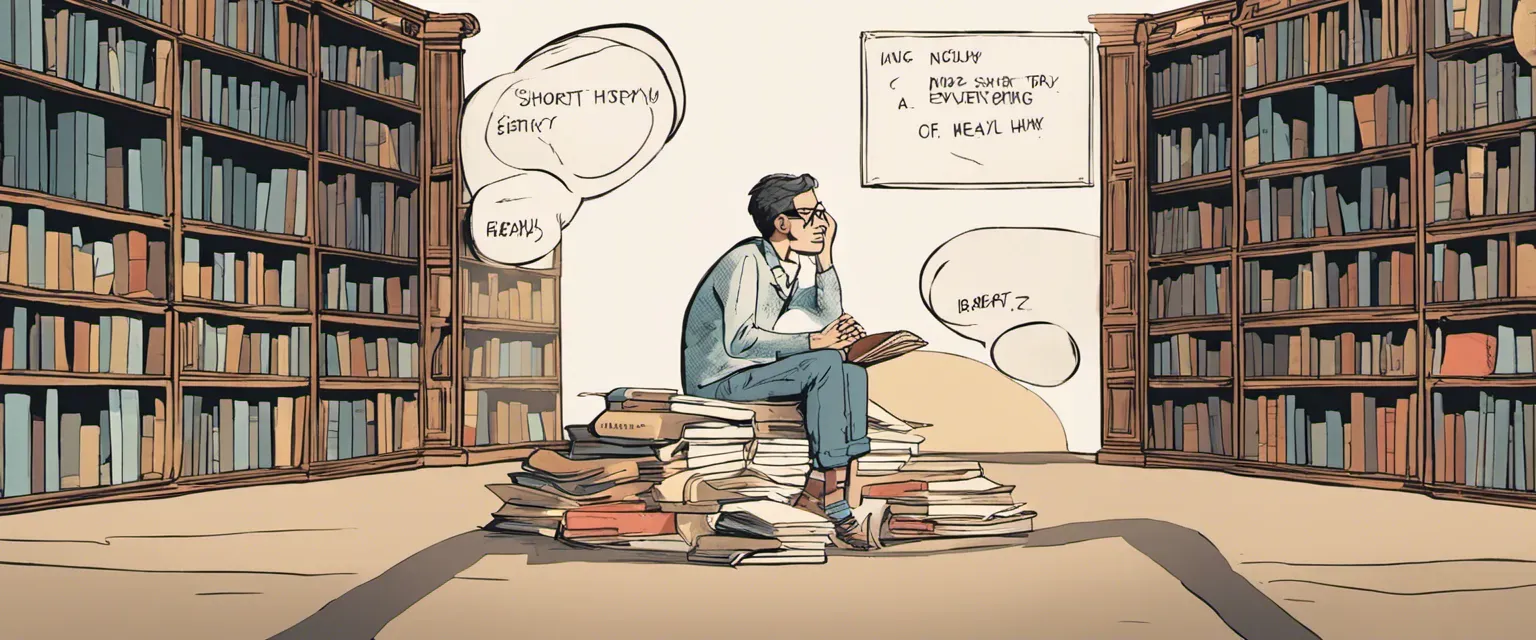
Chapter 1 What's A Short History of Nearly Everything
A Short History of Nearly Everything is a popular science book written by Bill Bryson. It was first published in 2003 and provides a broad overview of various scientific fields, including physics, chemistry, geology, paleontology, and biology. The book aims to simplify complex scientific concepts and explain the history of our understanding of the universe, Earth, and life. It also explores the challenges faced by scientists and the vastness of the natural world. A Short History of Nearly Everything became a bestseller and received critical acclaim for its engaging writing style and ability to make science accessible to a wide range of readers.
Chapter 2 Why is A Short History of Nearly Everything Worth Read
A Short History of Nearly Everything by Bill Bryson is worth reading for several reasons:
- Engaging writing style: Bryson has a knack for making complex scientific concepts accessible and enjoyable for readers. His writing is witty, humorous, and engaging, making it easier to grasp the information presented in the book.
- Comprehensive coverage: The book covers a wide range of scientific topics, including cosmology, geology, biology, and evolution. Bryson touches on almost every aspect of scientific knowledge, providing a well-rounded understanding of many different fields.
- User-friendly approach: Bryson presents scientific concepts in a way that is easy to understand for non-experts. He breaks down complex theories and ideas into more digestible chunks, allowing readers from all backgrounds to comprehend and appreciate the information.
- Fascinating anecdotes: Throughout the book, Bryson includes numerous fascinating anecdotes and stories about the scientists who made groundbreaking discoveries. These stories add depth and human interest to the scientific concepts, making it easier to connect with and remember the information.
- Thought-provoking content: A Short History of Nearly Everything raises thought-provoking questions about the nature of our universe, our place in it, and how humans have come to understand it. It encourages readers to think critically and question the world around them.
Overall, Bryson's book is praised for its ability to make complex scientific concepts accessible, entertaining, and thought-provoking. It is a well-researched and comprehensive guide to understanding the history and current state of scientific knowledge, making it a valuable read for anyone interested in science and the world we live in.
Chapter 3 A Short History of Nearly Everything Summary
"A Short History of Nearly Everything" by Bill Bryson is a popular science book that explores the history and development of scientific knowledge. The book covers a wide range of topics, including astronomy, geology, biology, chemistry, and physics.
Bryson begins the book by discussing the origins of the universe, including the Big Bang theory and the formation of galaxies and stars. He then moves on to explore the history of the Earth, including the formation of the planet, the development of life, and the evolution of species.
Throughout the book, Bryson introduces readers to numerous scientists and their groundbreaking discoveries. He discusses figures such as Isaac Newton, Charles Darwin, and Albert Einstein, explaining their contributions to the scientific understanding of the world.
Bryson also delves into the history of scientific exploration, recounting expeditions to remote locations and discoveries of ancient fossils and artifacts. He highlights the challenges and dangers faced by early scientists and explores the impact of their findings on our understanding of the natural world.
In addition to the scientific content, Bryson also touches on the social and cultural aspects of scientific exploration. He discusses the role of politics and funding in scientific research, as well as the ethical considerations surrounding some scientific discoveries.
Overall, "A Short History of Nearly Everything" provides an accessible and engaging overview of the history of scientific knowledge. It aims to inspire curiosity and a sense of wonder about the natural world, making complex scientific concepts understandable and relatable to a wide audience.

Chapter 4 A Short History of Nearly Everything Author
Bill Bryson, born on December 8, 1951, is an American-British author known for his humorous travelogues and nonfiction books. While he has written various books, "A Short History of Nearly Everything" is one of his most notable works.
"A Short History of Nearly Everything" was first published in 2003. It delves into a wide range of scientific topics, covering the history of science, the universe, and everything in between. It aims to explain complex scientific concepts in a more accessible and entertaining manner.
Apart from "A Short History of Nearly Everything," Bill Bryson has written several other widely acclaimed books, including:
- "Notes from a Small Island" (1995): Bryson's humorous account of his travels around Great Britain.
- "A Walk in the Woods" (1998): The author chronicles his attempt to hike the Appalachian Trail in the United States.
- "In a Sunburned Country" (2000): Bryson shares his experiences during his journey across Australia.
- "The Lost Continent" (1989): A humorous exploration of America's small towns and forgotten places.
Regarding the editions, the latest edition of "A Short History of Nearly Everything" was published in 2010. However, the best edition ultimately depends on personal preference, as subsequent editions often incorporate updated information and corrections. It is recommended to go for the most recent edition available to get the most up-to-date content.
Chapter 5 A Short History of Nearly Everything Meaning & Theme
A Short History of Nearly Everything Meaning
"A Short History of Nearly Everything" by Bill Bryson is a non-fiction book that explores the scientific discoveries, historical events, and theoretical concepts that have shaped our understanding of the world and the universe we live in.
The book's meaning can be summed up in the title itself - it aims to provide a comprehensive overview of various scientific disciplines and historical milestones in a way that is accessible to a general audience. Bryson's goal is to make complex scientific ideas understandable and engaging to readers who may not have a background in science.
By delving into topics such as the origins of the universe, the evolution of life on Earth, geological forces, the structure of atoms, and the mysteries of space, Bryson seeks to demonstrate how much we have come to know about the world through scientific inquiry. He also highlights the remarkable achievements and the stories of the scientists who made these discoveries, putting them into a historical context.
Additionally, the book serves as a reminder of our place in the universe and the interconnectedness of all scientific disciplines. It emphasizes the importance of curiosity, critical thinking, and collaboration in advancing our understanding of the world.
Overall, "A Short History of Nearly Everything" offers readers a blend of scientific facts, historical anecdotes, and Bryson's playful writing style, aiming to inspire a sense of wonder and curiosity while deepening our appreciation for the scientific endeavors that have shaped our understanding of the world.
A Short History of Nearly Everything Theme
The theme of "A Short History of Nearly Everything" by Bill Bryson revolves around the exploration of the vast complexity and wonder of the universe, as well as the interconnectedness of all scientific knowledge.
- Wonder and Curiosity: Throughout the book, Bryson expresses a sense of awe and wonder about the universe and the natural world. He explores various scientific disciplines and phenomena, from astronomy to geology, with the intent of inspiring the reader's curiosity and sense of wonder.
- The Complexity of Science: Bryson delves into the intricate details of scientific theories and discoveries, highlighting the complexity of scientific concepts while making them accessible to a non-expert audience. The book emphasizes the challenges faced by scientists over centuries as they sought to understand the world around them.
- Human Exploration and Achievement: Bryson highlights the remarkable achievements of human beings in their quest to understand the natural world. He discusses the accomplishments of early scientists, such as Copernicus and Darwin, and their contributions to our knowledge and understanding.
- Interconnectedness: The book emphasizes the interconnectedness of scientific knowledge across different disciplines. Bryson explores how discoveries in astronomy, for example, can have implications for our understanding of geology or biology. He demonstrates how seemingly distinct areas of study are interconnected, contributing to a more comprehensive understanding of the world.
- Humility and Perspective: Throughout the book, Bryson emphasizes the vastness and complexity of the universe, which humbles the reader and puts human existence into perspective. He emphasizes the limits of human knowledge and the continuing mysteries that remain unsolved, reminding us of the vastness of the unknown.
Overall, the theme of "A Short History of Nearly Everything" is the exploration and appreciation of the wonders of the universe, the interconnectedness of scientific knowledge, and the humility that comes from acknowledging the limits of human understanding.

Chapter 6 Other Accessible Resources
- A Short History of (Nearly) Everything Paranormal: Our Secret Powers Telepathy, Clairvoyance & Precognition
- "The Body: A Guide for Occupants" by Bill Bryson - Another popular book by Bryson that delves into the fascinating world of human anatomy and physiology, providing an accessible and engaging overview of how our bodies work.
- "Astrophysics for People in a Hurry" by Neil deGrasse Tyson - A concise and informative book by renowned astrophysicist Neil deGrasse Tyson, which offers an accessible exploration of the universe, its origins, and the fundamental principles of astrophysics.
- "The Disappearing Spoon: And Other True Tales of Madness, Love, and the History of the World from the Periodic Table of Elements" by Sam Kean - This engaging book explores the periodic table and the fascinating stories behind each element, combining science, history, and quirky anecdotes.
- "Sapiens: A Brief History of Humankind" by Yuval Noah Harari - This book provides a sweeping overview of the history of Homo sapiens, from the emergence of our species in Africa to the present day, covering various topics including biology, anthropology, and human civilization.
- "The Gene: An Intimate History" by Siddhartha Mukherjee - A comprehensive exploration of genetics and the history of the gene, highlighting the individuals and discoveries that have shaped our understanding of DNA and its implications for human health and society.
- "The Immortal Life of Henrietta Lacks" by Rebecca Skloot - This book tells the true story of Henrietta Lacks, a woman whose cells were unknowingly taken and became one of the most important tools in medical research, revolutionizing our understanding of biology and leading to breakthroughs in various fields.
- "The Making of the Atomic Bomb" by Richard Rhodes - A Pulitzer Prize-winning book that chronicles the scientific, political, and ethical complexities surrounding the development of the atomic bomb, from the early discoveries of atomic physics to the Manhattan Project and its aftermath.
- "The Elegant Universe: Superstrings, Hidden Dimensions, and the Quest for the Ultimate Theory" by Brian Greene - An exploration of the cutting-edge field of theoretical physics and the quest for a unified theory of everything, offering insights into concepts such as quantum mechanics, relativity, and string theory.
- "The Brain That Changes Itself: Stories of Personal Triumph from the Frontiers of Brain Science" by Norman Doidge - This book explores the human brain's remarkable ability to adapt and change throughout life, showcasing the groundbreaking research and stories of individuals who have overcome neurological challenges and transformed our understanding of the brain.
A Short History of Nearly Everything quotes as follows:
- "We are all just atoms, made up of atoms, and we will all eventually return to atoms. In the grand scheme of the universe, we are truly tiny and insignificant."
- "The history of science is filled with brilliant minds who questioned the status quo and pushed the boundaries of knowledge. We owe a great debt to these curious thinkers."
- "The universe is a truly remarkable place, full of wonders that we are only just beginning to understand. The more we learn, the more we realize how much we don't know."
- "Human beings are a product of billions of years of evolution. We are connected to every living thing on Earth through a shared ancestry."
- "There is beauty and complexity in even the tiniest natural processes. From the formation of a raindrop to the explosion of a star, the universe is constantly creating and destroying."
- "The Earth is a fragile planet, and we must do everything we can to protect it. We are the stewards of this planet, and the choices we make now will determine the future for generations to come."
- "Science is not just a collection of facts; it is a way of thinking. It encourages us to question, to investigate, and to never stop learning."
- "The history of life on Earth is a story of adaptation and survival. From the earliest single-celled organisms to the complex web of life we see today, every living thing has a unique role to play."
- "The more we explore the universe, the more we realize how rare and precious life is. We must cherish and protect it, for it may be the only one of its kind."
- "In the grand sweep of cosmic time, our lives are fleeting. We must make the most of the time we have, and strive to leave a positive legacy for future generations."
Chapter 8 Similar Books Like A Short History of Nearly Everything
- "Sapiens: A Brief History of Humankind" by Yuval Noah Harari
In this captivating exploration, Harari takes readers on a thought-provoking journey through the history of our species, from the emergence of Homo sapiens to the present day. Offering a unique perspective on our collective past, this book challenges conventional wisdom and delves into the drastic impact humans have had on the world.
- "The Gene: An Intimate History" by Siddhartha Mukherjee
Delving deep into the mysteries of genetics, Mukherjee's "The Gene" offers a compelling narrative that navigates the influence of genetic code on our lives. From the dawn of the discipline to the ethical quandaries of modern genetic research, this book masterfully combines scientific analysis with personal anecdotes, making for an enthralling and accessible read.
- "A Short History of Nearly Everything" by Bill Bryson
While you've already read this wonderful book, it undoubtedly deserves a mention on this list. Bryson takes readers on an awe-inspiring journey through the realms of science, exploring the origin of the universe, the history of our planet, and the wonders of the natural world. Packed with fascinating anecdotes and written in Bryson's signature style, it's a must-read for any science enthusiast.
- "The Immortal Life of Henrietta Lacks" by Rebecca Skloot
This gripping nonfiction work traces the origin of HeLa cells, which played a crucial role in numerous scientific breakthroughs, but whose story was shrouded in ethical concerns and injustice. Skloot unravels the tale of Henrietta Lacks and the medical community's exploitation of her cells, touching upon issues of race, consent, and medical ethics in the process.
- "The Disappearing Spoon: And Other True Tales of Madness, Love, and the History of the World from the Periodic Table of the Elements" by Sam Kean
Blending science, history, and astonishing anecdotes, this informative and entertaining book provides a fresh perspective on the periodic table. Kean presents the elements as characters, weaving together stories of their discovery, impact on humanity, and the hidden drama behind their scientific properties.
Embrace the rich tapestry of knowledge woven throughout these five books, each offering a unique lens through which to explore the mysteries and events that have shaped our world.

